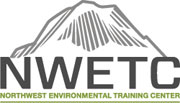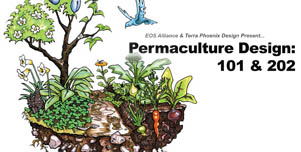On November 20th and 21st EOS will be helping to host two workshops about permaculture. This will be a great opportunity to learn more about sustainable agriculture, what you can do at home, and what practices are best both for the environment and for you! The two workshops will build off of each other, offering differing levels of complexity and depth. In addition, these classes will be an excellent chance to network with other folks in your area interested in permaculture design.
Permaculture 101: November 20th from 10:00 am to 5:30 pm
Permaculture 202: November 21st from 10:00 am to 5:30 pm
Cost: $25-35 (Sliding scale)
Location: Seattle University
Preregistration required: please register online here Or RSVP with Kelly (kferron@eosalliance.org)

The workshop is taught by Dave Boehnlein, who serves as the principal for Terra Phoenix Design and the education director at the Bullock’s Permaculture Homestead on Orcas Island. An experienced Permaculture educator and designer, Dave's special interests include sustainability education, horticulture, agroforestry, and site development. Dave has worked in Washington, California, Hawaii, Nicaragua & Costa Rica. He has a talent for research, organizational leadership, and leading work crews. Dave is particularly interested in education, the mainstreaming of sustainability, and keeping things organized.
Permaculture 101:
This fun six hour introductory workshop will take you through the permaculture basics, give excellent examples of permaculture in action, and guide you through fun and insightful hands-on projects.
You will learn about:
Permaculture History and Definitions
Ethics
Design Principles
Afterward you will take a virtual slideshow tour of permaculture in action at three different scales: urban backyards, rural homesteads, and community/regional level initiatives.
You will end the day by getting a chance to put what you’ve learned into practice by working on a design scenario with a team of your peers.
Permaculture Design 202:
This class builds on information presented in Permaculture Design 101. We recommend
either having taken PC Design 101 or have equivalent knowledge of permaculture ethics and principles before taking PC Design 202.
You will learn about
Site Assessment – observation, landscape reading, and research tools
The Process of Permaculture Design and Design Methods – how to begin and generate ideas
Implementation Planning – the “soft” and “hard” skills necessary to install a permaculture project
Each segment will involve going outside to practice what you’ve learned. We will be going outside rain or shine, so make sure you come with appropriate clothing. At the end of the day you will get a chance to work with a team to design a permaculture project on a real piece of land near the workshop site.
For more information about permaculture, please visit the following sites:
The Bullock's Permaculture Homestead (http://PermaculturePortal.com)
Terra Phoenix Design (http://TerraPhoenixDesign.com)
Friends of the Trees Society (http://www.friendsofthetrees.net/)
Hope to see you there!!









